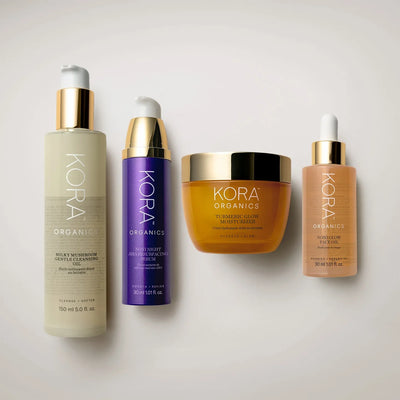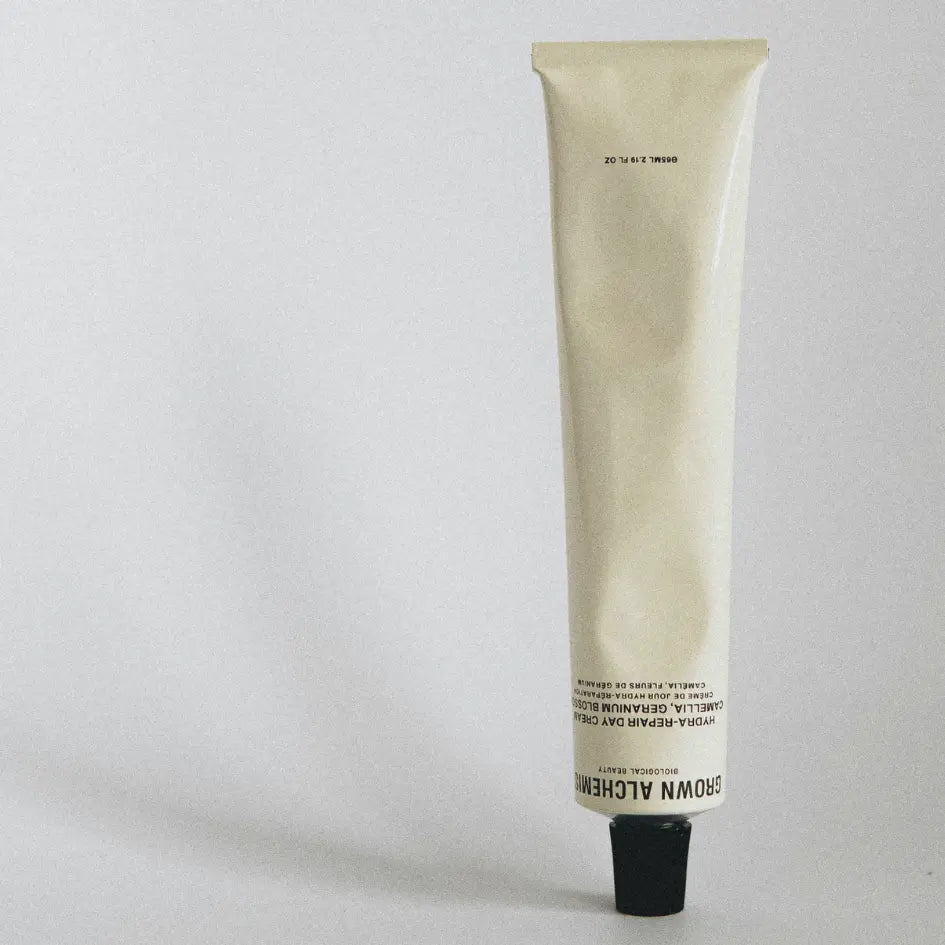Kora Organics
Our ratings are based on a scale from 1 (Avoid) to 5 (Top Choice).
See how we rate.
The Shifting Gaia rating evaluates brands based on sustainable practices, ingredients and materials, and social responsibility, among others. Below are a few factors influencing this brand's score:
overview
about
Kora Organics is a skincare brand offering creams, serums, and oils made with certified organic ingredients. Highlights
• COSMOS Organic Certified (Ecocert)
• Climate Neutral Certified
• PETA Cruelty-Free Certified
• EWG Verified
sustainability
details:
Packaging
All new products since 2021 use only recycled, recyclable, or biodegradable materials for both primary and secondary packaging. For example, the brand has transitioned to glass jars and bottles for many products and uses post-consumer recycled (PCR) plastic resin for others. Unit cartons were reformulated from virgin paper to FSC-certified 100% recycled paper (at least 85% PCR) that is fully recyclable. Kora has also introduced refillable pods for several products.
Despite these efforts, Kora's packaging still relies heavily on plastics. The refill pods and some bottles/tubes are made of PCR plastic, and even with recycled content, plastic is still present.
Ingredient Sustainability
The brand is COSMOS-certified organic by Ecocert, meaning formulations meet strict standards for organically farmed ingredients and exclude environmentally harmful chemicals. Across our assessment sample, products contained 99–100% natural origin content, high organic percentage, and avoided petrochemicals.
Kora's ingredients are predominantly plant-based, grown with organic methods that reduce pollution and fertilizer runoff, and processed in ways that preserve biodegradability. The brand categorically avoids fossil-fuel-derived compounds. By banning synthetic pesticides and fertilizers through organic sourcing, Kora indirectly benefits biodiversity and water quality at the farming stage.
All ingredients chosen either biodegrade readily in the environment or are benign minerals, meaning the ecotoxicity of product runoff is minimal.
Energy Use and Footprint
The company is Climate Neutral Certified, meaning it measures its carbon emissions annually, implements reduction strategies, and offsets the remainder to achieve net-zero carbon emissions. Kora partnered with the nonprofit Climate Neutral to assess its greenhouse gas footprint and has verified its offsets through an independent program.
Waste Management
The brand does not publish details about its manufacturing waste, recycling rates, or water conservation in production. Ecocert/COSMOS audits do cover some aspects of production, ensuring good manufacturing practices. They likely encourage or require basic environmental management in factories.
Additionally, by using concentrated formulations (many products are potent oils/serums) and offering refills, they indirectly reduce waste downstream (less frequent full-component disposal). However, there's a lack of concrete data or initiatives on production waste reduction, water saving, or circularity in operations.
Business Model
Kora's product line is curated rather than explosively large. Another positive in Kora's model is the integration of refillable products. By offering refill pods for its moisturizers and eye cream, the brand inherently encourages customers to reuse packaging.
non-toxic
details:
The brand's formulations are practically the definition of “clean” beauty, rigorously avoiding known harmful chemicals and irritants. Every product is certified to the COSMOS Organic standard, which comes with a built-in “banned ingredient list” covering many cosmetic toxicants.
In practice, Kora has eliminated all the common offenders: you will find no parabens, no synthetic fragrances, no phthalates, no sulfates (SLS/SLES), no PEGs, no formaldehyde-releasing preservatives, no ethanolamines, no petrochemical mineral oils, and no silicones in its ingredient lists.
Preservation is achieved with food-safe preservatives (like sodium benzoate, potassium sorbate) and natural antimicrobial extracts (radish ferment, aspen bark, etc.), and all fragrances come from natural essential oils (which are disclosed allergen by allergen per EU rules).
social responsibility
details:
Fair labor is one dimension where Kora Organics has limited visibility. The brand does emphasize quality and certification of ingredients, but it does not publicly document its labor practices across the supply chain in detail. We found no published reports or audits regarding factory working conditions, wages, or supplier labor standards.
Kora Organics is staunchly cruelty-free and largely vegan, with strong policies to ensure no animals are harmed in the making of its products. The brand is certified by PETA as cruelty-free.
Kora has an ongoing partnership with the Organic Farming Research Foundation (OFRF), a nonprofit that promotes organic and sustainable agriculture through research and education. Kora has also participated in charitable giving. For example, on International Women's Day, Kora donated 50% of all proceeds from that day's sales to two organizations: Harvest Home (a Los Angeles-based charity for homeless pregnant women and their children) and The Royal Women's Hospital Foundation in Australia.





